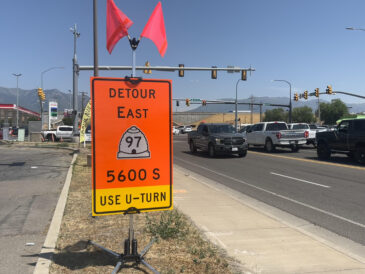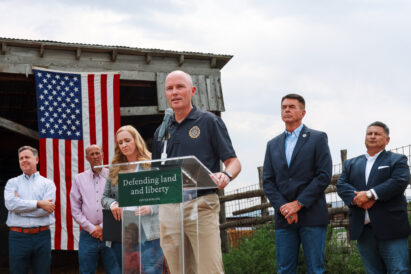University students, faculty, concerned citizens discuss impact of DEI legislation at Ogden forum
- Betty Sawyer of the NAACP Ogden Branch speaks during a community conversation about diversity, equity and inclusion, or DEI, in higher education at Grounds For Coffee in Ogden on Wednesday, Oct. 30, 2024.
- Utah Senate candidate Stacy Bernal speaks during a community conversation about diversity, equity and inclusion, or DEI, in higher education at Grounds For Coffee in Ogden on Wednesday, Oct. 30, 2024.
- University of Utah professor William A. Smith speaks during a community conversation about diversity, equity and inclusion, or DEI, in higher education at Grounds For Coffee in Ogden on Wednesday, Oct. 30, 2024.
- Former Weber State University President Chuck Wight speaks during a community conversation about diversity, equity and inclusion, or DEI, in higher education at Grounds For Coffee in Ogden on Wednesday, Oct. 30, 2024.
OGDEN — The NAACP Ogden Branch hosted a community discussion Wednesday at Grounds For Coffee on the impact of diversity, equity and inclusion programs — or, rather, the lack thereof since House Bill 261 took effect earlier this year — at Utah’s higher education institutions.
The discussion, which was the latest in a series of similar events at the location, was moderated by professors Richard Greene and Rachel Robison-Greene of Weber State and Utah State universities, respectively.
Students and faculty from WSU and other universities in the state were among the several dozen people who packed into the coffee house Wednesday evening for the event. Joining them were concerned citizens — including former Weber State President Chuck Wight — representation from the Weber County League of Women Voters, local government workers, as well as current and prospective state legislators, including Rep. Rosemary Lesser, D-Ogden; Utah Senate candidate Stacy Bernal, D-Ogden; and Ogden City Council member Angela Choberka, D-Ogden.
The effects of H.B. 261 have been felt throughout Utah. Locally, Weber State shuttered a number of cultural centers serving Black, Latino, LGBTQ+, Native American and female students over the summer rather than finding ways to change them in order to comply with the new, anti-DEI legislation. What remains of those services have coalesced under the umbrella of the university’s Student Success Center.
Similar developments have occurred at other universities statewide.
Attending students and educators alike bemoaned a loss of services for underrepresented and minority communities throughout the discussion, with many opining that additional legislation targeting DEI programs and those they serve would be coming at local, state and national levels.
“We’re all having conversations in our own places and spaces, but my concern is that if we don’t have these kind of conversations, those that pass this kind of legislation would feel emboldened to do even more,” said Betty Sawyer of the Ogden NAACP during the discussion.
Added Sawyer: “The struggle that the students went through to get a Black culture center. Years, years of flunking classes, missing meals, sleeping on the floors. And research showed that there was a need and a recommendation, and it finally came to fruition. And in less than a year — gone. … It took them 20, 30, 40 years to build these programs and, overnight, they’re gone. And they’ve created something totally different.”
University administrators and state legislators also were accused by some attendees of attempting to “whitewash” instances of racial aggression and service deficits on campuses rather than acknowledging them and/or attempting to address them meaningfully.
University of Utah professor William A. Smith also spoke during the event about his research of “racial battle fatigue” — which he described as “a systemic, racism-related, repetitive stress injury.” In other words, the myriad forms of physical, mental and emotional strain suffered by members of racially oppressed groups via micro- and macroaggressions.
“It accounts for the toll that it takes on the body, on the mind, on your emotions. … How you get exhausted just waking up every day knowing that you have to confront a world that might see you as something as other, as less than human. What is that toll?” Smith said.
Smith posited that the effects could be measured a number of ways, including through stress hormones and telomere dynamics.
Throughout the night, speakers stressed the need for continued effort and discussion of DEI-related issues.
Said Bernal: “Sometimes it feels like this is very hard, impossible, lonely work. But I believe that we can do this uphill battle, and that we can continue to make the change.”











